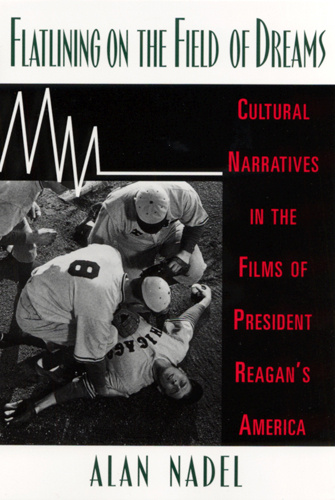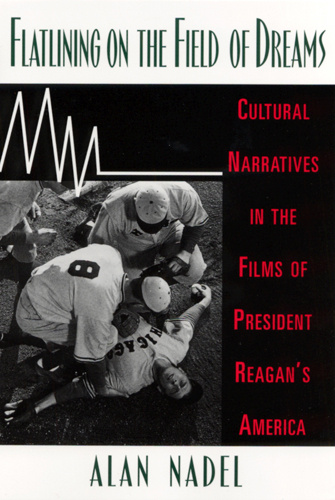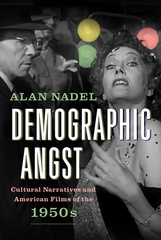Flatlining on the Field of Dreams
Cultural Narratives in the Films of President Reagan's America
By Alan Nadel
Rutgers University Press
"Flatlining on the Field of Dreams takes a apart some of the most commercially successful films of the epoch, demonstrating how they reflected, debated, and played with the dominant ideology of the time. . . . cleverly and wittily written . . . . The book will work extremely well in the classroom."
-Film Quarterly
"From Back to the Future to Forrest Gump, Nadel shows not only how notions of cinematic time re-script political change but how our very conceptualizations of change are thematized by our experiences of watching movies. This is not simply film history, or film as history, but film affirming "history" in the same way that Ronald Reagan affirmed film narratives."
-Susan Jeffords, University of Washington
"Flatlining on the Field of Dreams brilliantly restages the cultural narratives associated with Reaganism within a neo-imperialist cinematic space and reveals the heretofore unexamined role class played in the reproduction of those narratives."
-Donald E. Pease, Dartmouth College
Flatlining on the Field of Dreams demonstrates, with witty prose and careful analysis, how the overindulgent, image-conscious years of the Reagan administration are reflected in sundry aspects of American films produced during that era. Discussing dozens of films, including Home Alone, Beetlejuice, Ghost, The Little Mermaid, Working Girl, Who Framed Roger Rabbit?, and Trading Places, Alan Nadel identifies narratives about credit, deregulation, gender, race, and masculinity that defined "President Reagan's America." Linking the way Hollywood films work to the stories they tell, he explains how the ideas and values of Reaganism became the symbolic food of a hyper-consumptive society. The book provides hard-to-ignore demonstrations of the extensive synergy between politics, history, and popular culture.
-Film Quarterly
"From Back to the Future to Forrest Gump, Nadel shows not only how notions of cinematic time re-script political change but how our very conceptualizations of change are thematized by our experiences of watching movies. This is not simply film history, or film as history, but film affirming "history" in the same way that Ronald Reagan affirmed film narratives."
-Susan Jeffords, University of Washington
"Flatlining on the Field of Dreams brilliantly restages the cultural narratives associated with Reaganism within a neo-imperialist cinematic space and reveals the heretofore unexamined role class played in the reproduction of those narratives."
-Donald E. Pease, Dartmouth College
Flatlining on the Field of Dreams demonstrates, with witty prose and careful analysis, how the overindulgent, image-conscious years of the Reagan administration are reflected in sundry aspects of American films produced during that era. Discussing dozens of films, including Home Alone, Beetlejuice, Ghost, The Little Mermaid, Working Girl, Who Framed Roger Rabbit?, and Trading Places, Alan Nadel identifies narratives about credit, deregulation, gender, race, and masculinity that defined "President Reagan's America." Linking the way Hollywood films work to the stories they tell, he explains how the ideas and values of Reaganism became the symbolic food of a hyper-consumptive society. The book provides hard-to-ignore demonstrations of the extensive synergy between politics, history, and popular culture.
Flatlining on the Field of Dreams takes a apart some of the most commercially successful films of the epoch, demonstrating how they reflected, debated, and played with the dominant ideology of the time. . . . cleverly and wittily written . . . . The book will work extremely well in the classroom.
From Back to the Future to Forrest Gump, Nadel shows not only how notions of cinematic time re-script political change but how our very conceptualizations of change are thematized by our experiences of watching movies. This is not simply film history, or film as history, but film affirming history in the same way that Ronald Reagan affirmed film narratives.
'Flatlining on the Field of Dreams brilliantly restages the cultural narratives associated with Reaganism within a neo-imperialist cinematic space and reveals the heretofore unexamined role class played in the reproduction of those narratives.'
Flatlining on the Field of Dreams takes a apart some of the most commercially successful films of the epoch, demonstrating how they reflected, debated, and played with the dominant ideology of the time. . . . cleverly and wittily written . . . . The book will work extremely well in the classroom.
From Back to the Future to Forrest Gump, Nadel shows not only how notions of cinematic time re-script political change but how our very conceptualizations of change are thematized by our experiences of watching movies. This is not simply film history, or film as history, but film affirming history in the same way that Ronald Reagan affirmed film narratives.
'Flatlining on the Field of Dreams brilliantly restages the cultural narratives associated with Reaganism within a neo-imperialist cinematic space and reveals the heretofore unexamined role class played in the reproduction of those narratives.'
Alan Nadel is Professor of Literature at Rensselaer Polytechnic Institute.
Introduction: Class, Film, and President Reagan's America
1. Back to the Futures Market: The Cinematic Realities and Trading Places of President Reagan's America
2. Flatlining on the Field of Dreams
3. The Pretty Woman, The Little Mermaid, and the Working Girl Become "Part of That World"
4. "I'm Not Really Bad. I'm Just Drawn That Way": The Compulsive-Attraction Film
5. Home and Homelessness Alone in John Hughes's America, or Dennis the Menace II Society
6. Seas of Love and Murderous Doubles: AIDS Narratives and the Dangers of the Other
Conclusion: The Enduring Power of Reaganism and the Movies
1. Back to the Futures Market: The Cinematic Realities and Trading Places of President Reagan's America
2. Flatlining on the Field of Dreams
3. The Pretty Woman, The Little Mermaid, and the Working Girl Become "Part of That World"
4. "I'm Not Really Bad. I'm Just Drawn That Way": The Compulsive-Attraction Film
5. Home and Homelessness Alone in John Hughes's America, or Dennis the Menace II Society
6. Seas of Love and Murderous Doubles: AIDS Narratives and the Dangers of the Other
Conclusion: The Enduring Power of Reaganism and the Movies






